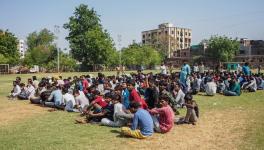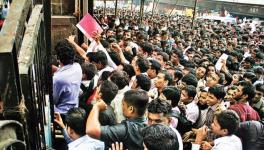Why is the App-based Attendance System Agitating MGNREGA Workers?
Image Courtesy: PTI
MGNREGA (Mahatma Gandhi National Rural Employment Guarantee Act) workers' protest against an app-based attendance system has been ongoing for the last 10 days. The protest that started on February 13 is not showing signs of dying down soon as the government authorities have not shown any remorse for meeting protesters.
The government has imposed the mandatory use of an app-based attendance system through the National Mobile Monitoring Software (NMMS) from January 1 this year. As per the protesting workers, the app has created a simple process of taking attendance, a complex and time-consuming task with many irregularities and errors.
HOW DOES THE APP WORK?
NMMS is the software being used by the government to register attendance. The app requires two geo-tagged photographs of the worker every day twice. Once in the morning, when the worker comes to the work site and again when leaving the work in the evening. As a result, when the app fails to upload pictures or mark attendance, the work done by the worker won't count, and the worker won't get paid.
Workers and people associated with the scheme alleged that the software only works with good internet connectivity. As part of MGNREGA schemes, much work is done in extremely rural locations where internet connectivity is inaccessible. In this context, this newly launched system is becoming a disaster.
"In the last two months, most of our evenings were spent in the harsh cold under the open sky. We used to finish the work by 6 PM, and for the next two hours, we just used to wait for the app to enrol our attendance. It sometimes took two hours for my turn to register as the app didn't work correctly. I used to reach home late on cold winter nights," Mandawi Kumari, an MGNREGA worker from Bihar, told NewsClick. Kumari has been working under the MGNREGA scheme for the last six years.
LACK OF TRANSPARENCY AND RIGOROUS TESTING
All applications introduced by the government go through Standardisation Testing and Quality Certification (STQC). Its sole purpose is to ensure testing and quality certification. Tech experts believe that most applications enforced in social security schemes lack rigorous testing and feedback mechanism.
Speaking with NewsClick on the NMMS app's issues, Srinivas Kodali, a researcher associated with the 'Open source software movement,' said, "The problem with software development inside the Government of India is a lack of quality and general software testing. The organisation responsible for this Standardisation Testing and Quality Certification of the Ministry of Electronics & Information Technology does not test and certify any apps. The government has no intention to listen to the problems of MGNREGA workers resulting from this mandatory app."
He further stressed that most of these apps do not share the source code in the public domain as they should because these are government-funded software created with taxpayers' money which would enhance the transparency. Now, because there is no information regarding the various certifications and tested data in the public domain, there is no clarity on whether this app (NMMS) went through the proper STQC process.
"What we see here is the perfect example of privacy for government and transparency for citizens, which is ultimately the opposite of what a thriving democracy stands for," he added.
Another ongoing concern that has also been dominating the tech activist community is that by implementing these app-based systems in social security schemes, the government is creating a 'Digital Data Economy' simultaneously where the end goal of implementing this system is not welfare but creating a pool of private information of the masses.
GOVERNMENT'S ARGUMENTS
The government's argument for implementing the app-based attendance system was to ensure transparency and proper monitoring of the scheme on the ground. The real-time attendance of workers tracked through geo-tagged photographs of work sites was seen as a method to identify duplication, thus resolving alleged corruption in the MGNREGA. MGNREGA has been in crisis for the past few years. As rural workers struggle to find work and get paid on time, they find it increasingly difficult to find employment under the scheme. In addition, several cases of alleged fraud have been reported nationwide. In response, the government seeks solutions to enforce the technology to combat corruption. Implementation of the NMMS is the latest example of it.
Last year, the Centre halted the programme's funding for almost a year in West Bengal, alleging fraud. However, experts believe that the government is using alleged fraud as a shield to cover its primary intention, which is to end the scheme slowly. In its Union Budget, the government allocated Rs 60,000 crore for the next financial year, compared with Rs 89,400 crore in 2022-23. This spending is the lowest since 2021-22 and 2022-23, when it was Rs 98,468 crore and Rs 89,400 crore, respectively.
Nikhil Dey, an activist from NREGA Sangharsh Morcha, called this budget a 'Bloodbath', stating that "it is a programme which does not allow less allocation, so they are now saying that since the market is giving jobs when there is a demand we will provide more money. The demand is there, and they are totally making this up. They have just cut the allocation."
DIGITAL DIVIDE
Apart from the technical issues in the NMMS system, other problems are becoming barriers to adequately implementing the system. Some of them are severe issues with an internet connection, fewer smartphones and low digital literacy among the NREGA workforce. From February 1, the government introduced the Aadhar-Based Payment System(ABPS), a decision seen as another directive in excluding a large workforce from MGNREGA.
Get the latest reports & analysis with people's perspective on Protests, movements & deep analytical videos, discussions of the current affairs in your Telegram app. Subscribe to NewsClick's Telegram channel & get Real-Time updates on stories, as they get published on our website.
























